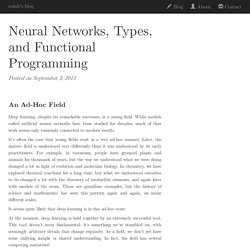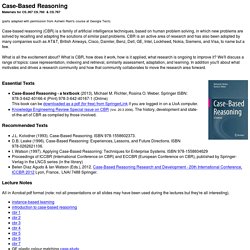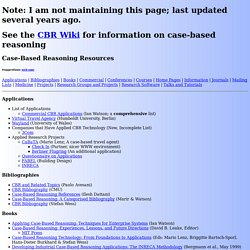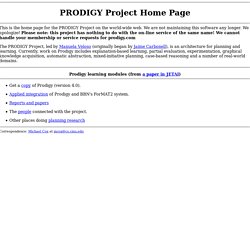

Peter norvig machine learning. Webcast Nov. 15 with IBM's Dr. Bruce Douglass- Neural Networks in UML: Supervised Machine Learning. Don't miss this one! #IBM… S Use of Your Data. Quora. Neural Networks, Types, and Functional Programming. Posted on September 3, 2015 An Ad-Hoc Field Deep learning, despite its remarkable successes, is a young field.

While models called artificial neural networks have been studied for decades, much of that work seems only tenuously connected to modern results. It’s often the case that young fields start in a very ad-hoc manner. Later, the mature field is understood very differently than it was understood by its early practitioners. It seems quite likely that deep learning is in this ad-hoc state. At the moment, deep learning is held together by an extremely successful tool. I think it is very likely that, reflecting back in 30 years, we will see deep learning very differently.
Deep Learning 30 Years in the Future If we think we’ll probably see deep learning very differently in 30 years, that suggests an interesting question: how are we going to see it? At present, three narratives are competing to be the way we understand deep learning. This is an extremely speculative idea. Conclusion More Posts. Is Haskell a good language to develop Artificial Intelligence related projects? : haskell. Home - minds.ai.
Artificial Intelligence. OpenAI. OpenAI is a non-profit artificial intelligence research company. Our goal is to advance digital intelligence in the way that is most likely to benefit humanity as a whole, unconstrained by a need to generate financial return. Since our research is free from financial obligations, we can better focus on a positive human impact. We believe AI should be an extension of individual human wills and, in the spirit of liberty, as broadly and evenly distributed as possible. The outcome of this venture is uncertain and the work is difficult, but we believe the goal and the structure are right. We hope this is what matters most to the best in the field. Background. Artificial Intelligence (AI), Logic Programming, Machine Learning, Expert Systems, etc.
Artificial Intelligence (AI), Logic Programming, Machine Learning, Expert Systems, etc.

Related Book Categories: Learning Deep Architectures for AI (Yoshua Bengio) This book discusses the motivations for and principles of learning algorithms for deep architectures. By analyzing and comparing recent results with different learning algorithms for deep architectures, explanations for their success are proposed. Logic Programming in Scheme (Nils M. MyCBR. Case-Based Reasoning Resources. (parts adapted with permission from Ashwin Ram's course at Georgia Tech) Case-based reasoning (CBR) is a family of artificial intelligence techniques, based on human problem solving, in which new problems are solved by recalling and adapting the solutions of similar past problems.

CBR is an active area of research and has also been adopted by many companies such as AT&T, British Airways, Cisco, Daimler, Benz, Dell, GE, Intel, Lockheed, Nokia, Siemens, and Visa, to name but a few. What is all the excitement about? Cbrwiki. David W. Aha: CBR Resources. Suggestions welcome Applications | Bibliographies | Books | Commercial | Conferences | Courses | Home Pages | Information | Journals | Mailing Lists | Medicine | Projects | Research Groups and Projects | Research Software | Talks and Tutorials Applications List of Applications Commercial CBR Applications (Ian Watson; a comprehensive list) Virtual Travel Agency (Humboldt University, Berlin) Wayland (University of Wales) Companies that Have Applied CBR Technology (New, Incomplete List) 3Com Applied Research Projects CaBaTA (Mario Lenz; A case-based travel agent) Check In (Partner, nicer WWW environment) Berliner Flugring (An additional application) Questionnaire on Applications FABEL (Building Design) INRECA Bibliographies Books Commercial.

Integrating Planning Learning PRODIGY JETAI 1995. PRODIGY project home page. This is the home page for the PRODIGY Project on the world-wide web.

We are not maintaining this software any longer. We apologize! Please note: this project has nothing to do with the on-line service of the same name! We cannot handle your membership or service requests for prodigy.com The PRODIGY Project, led by Manuela Veloso (originally began by Jaime Carbonell), is an architecture for planning and learning. Prodigy learning modules (from a paper in JETAI) Get a copy of Prodigy (version 4.0). Correspondence: Michael Cox at mcox@cs.cmu.edu.
CMU AI Repository.